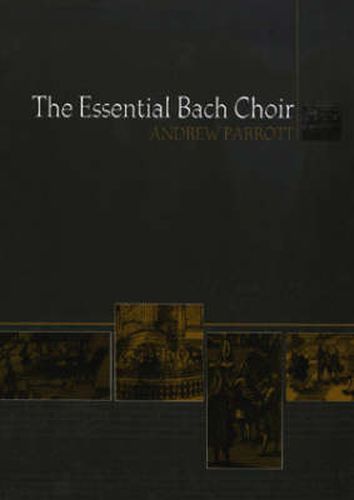Readings Newsletter
Become a Readings Member to make your shopping experience even easier.
Sign in or sign up for free!
You’re not far away from qualifying for FREE standard shipping within Australia
You’ve qualified for FREE standard shipping within Australia
The cart is loading…






What type of choir did Bach have in mind as he created his cantatas, Passions and Masses? How many singers were at his disposal in Leipzig, and in what ways did he deploy them in his own music? Seeking to understand the very medium of Bach’s incomparable choral output, Andrew Parrott investigates a wide range of sources: Bach’s own writings, and the scores and parts he used in performance, but also a variety of theoretical, pictorial and archival documents, together with the musical testimony of the composer’s forerunners and contemporaries. Many of the findings shed a surprising, even disturbing, light on conventions we have long taken for granted. A whole world away from, say, the typical oratorio choir of Handel’s London with which we are reasonably familiar, the essential Bach choir was in fact an expert vocal quartet (or quintet), whose members were also responsible for all solos and duets. (In a mere handful of Bach’s works, this solo team was selectively supported by a second rank of singers - also one per part - whose contribution was all but optional). Parrott shows that this use of a one-per-part choir was mainstream practice in the Lutheran Germany of Bach’s time: Bach chose to use single voices not because a larger group was unavailable, but because they were the natural vehicle of elaborate concerted music. As one of several valuable appendices, this book includes the text of Joshua Rifkin’s explosive 1981 lecture, never before published, which first set out this line of thinking and launched a controversy that is long overdue for resolution. ANDREW PARROTT has made a close study of historical performing practices in the music of six centuries, and for over twenty-five years he has been putting research into practice with his own professional ensembles, the Taverner Consort, Taverner Players and Taverner Choir.
$9.00 standard shipping within Australia
FREE standard shipping within Australia for orders over $100.00
Express & International shipping calculated at checkout
What type of choir did Bach have in mind as he created his cantatas, Passions and Masses? How many singers were at his disposal in Leipzig, and in what ways did he deploy them in his own music? Seeking to understand the very medium of Bach’s incomparable choral output, Andrew Parrott investigates a wide range of sources: Bach’s own writings, and the scores and parts he used in performance, but also a variety of theoretical, pictorial and archival documents, together with the musical testimony of the composer’s forerunners and contemporaries. Many of the findings shed a surprising, even disturbing, light on conventions we have long taken for granted. A whole world away from, say, the typical oratorio choir of Handel’s London with which we are reasonably familiar, the essential Bach choir was in fact an expert vocal quartet (or quintet), whose members were also responsible for all solos and duets. (In a mere handful of Bach’s works, this solo team was selectively supported by a second rank of singers - also one per part - whose contribution was all but optional). Parrott shows that this use of a one-per-part choir was mainstream practice in the Lutheran Germany of Bach’s time: Bach chose to use single voices not because a larger group was unavailable, but because they were the natural vehicle of elaborate concerted music. As one of several valuable appendices, this book includes the text of Joshua Rifkin’s explosive 1981 lecture, never before published, which first set out this line of thinking and launched a controversy that is long overdue for resolution. ANDREW PARROTT has made a close study of historical performing practices in the music of six centuries, and for over twenty-five years he has been putting research into practice with his own professional ensembles, the Taverner Consort, Taverner Players and Taverner Choir.